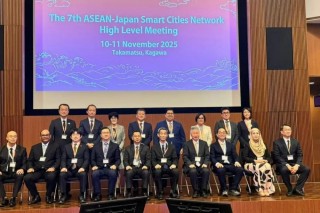Loading
Search
▼ Indonesia’s Expands Smart City Collaboration at ASEAN-Japan Forum
- Category:Event
The Indonesian Ministry of Home Affairs is leveraging the ASEAN-Japan Smart Cities Network High-Level Meeting in Takamatsu City, Kagawa Prefecture, Japan, to broaden opportunities for smart city cooperation.
Indonesia's delegation was led by Safrizal Zakaria Ali, the Director General of Regional Administration at the Ministry, who serves as the National Representative for the ASEAN Smart City Network (ASCN) and actively acts as the network's shepherd.
In his presentation, Safrizal stressed that developing innovative city capacity cannot be done in isolation; it requires the involvement of multiple stakeholders and a multi-pronged approach within a single ecosystem.
Similarly, innovative city development must run parallel with efforts to boost economic growth and expand investment.
"The Indonesian Government, through the Ministry of Home Affairs, remains fully committed to developing smart city schemes through a strategy of collaboration.
This spirit is not only at the local or national level but also international collaboration so that it can accelerate the maturity of smart cities in the regions," he said in a release from Jakarta on Monday, November 10, 2025, as quoted by Antara.
The forum, held for the seventh time, brings together delegates from Southeast Asian countries (ASEAN), including Indonesia, Thailand, Malaysia, the Philippines, and Vietnam, along with the Japanese Government and the United Nations Centre for Regional Development (UNCRD).
Beyond presenting strategies to accelerate smart city development, Safrizal shared implementation opportunities in several local administration.
"Currently, we have four local administration that are members of ASCN: DKI Jakarta, Makassar City, Banyuwangi Regency, and Sumedang Regency. Moving forward, we project several local governments, including Surabaya City as a smart industrial and sea port city, Semarang City as a smart resilience city, Palembang City as a smart river city, and Denpasar City as a smart cultural city.
All have their own distinct characteristics," he explained.
Safrizal emphasized that the strategic partnership between ASEAN countries and the Japanese Government aims not only to build mutual cooperation but also to support regional stability and open up investment opportunities.
"Aside from sharing experiences and information, this high-level meeting in Japan is a momentum to affirm Indonesia's role and position in the region, specifically to enhance investment opportunities, especially in the realm of urban governance.
The simplest example is the urban waste problem, which requires investment support of US$18.4 billion until 2040 as part of green infrastructure development," he concluded.
- November 11, 2025
- Comment (0)
- Trackback(0)


